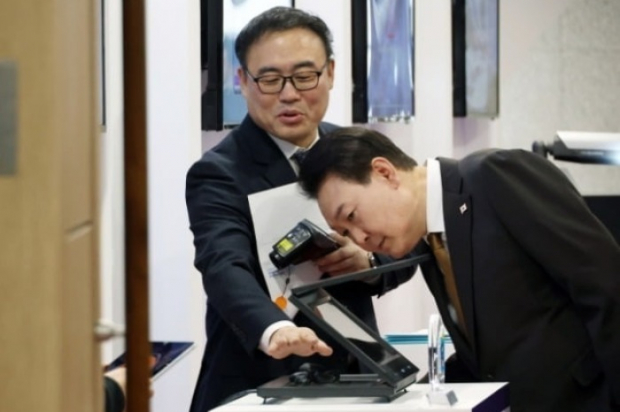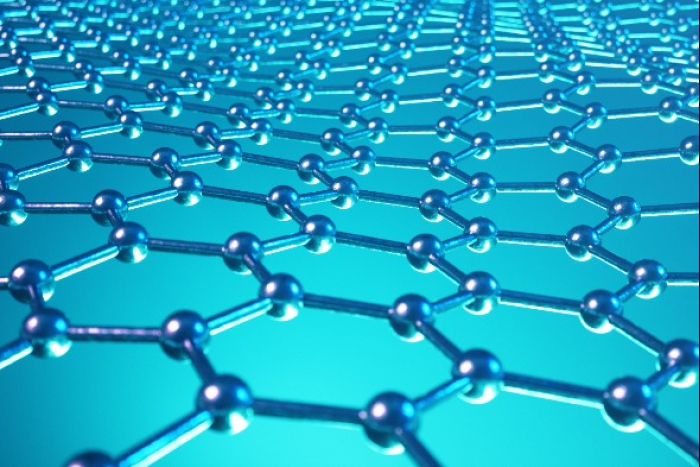Bio & Pharma
Nanodrug maker CEO calls on Yoon government for deregulation
Korea lacks support and guidelines for biotech firms developing nanomedicine, says graphene researcher Hong Byung-hee
By Feb 03, 2023 (Gmt+09:00)
2
Min read
Most Read
LG Chem to sell water filter business to Glenwood PE for $692 million


Kyobo Life poised to buy Japan’s SBI Group-owned savings bank


KT&G eyes overseas M&A after rejecting activist fund's offer


StockX in merger talks with Naver’s online reseller Kream


Mirae Asset to be named Korea Post’s core real estate fund operator



South Korean startups won four out of the 23 Best of Innovation awards at CES 2023, the world’s largest tech show last month. Among the winners was Graphene Square Inc., which showcased its virtual fireplace that generates heat from a material called graphene.
Graphene is as thin as 0.33 nanometers, or about one million times thinner than a sheet of paper. The material, highly conducive and strong, is increasingly used in drug delivery systems.
Graphene Square is headed by Byung-hee Hong, a professor at the department of chemistry at Seoul National University. He is also a founder and CEO of Biographene Inc., a Korean biotech startup that develops graphene-based nanomedicine for multiple indications and diseases including Parkinson’s and Alzheimer’s.
Hong also led the development of Graphene Kitchen Styler, a heating appliance used for outdoor cooking, which was named one of the Best Inventions of 2022 by Time magazine.

KOREAN NANODRUG FIRMS TURNING TO THE US
But it is hard to continue to develop nanodrugs in Korea due to a lack of guidelines and government support, Hong told The Korea Economic Daily on Feb. 3.
“Many Korean nanodrug makers move to the US for clinical studies. It is a huge loss for Korea as nanomedicine can be a cash cow, potentially greater than semiconductors,” said Hong.
Hong said he gave President Yoon Suk-yeol a handwritten letter during a luncheon with the other CEOs of the CES 2023 winners on Feb. 2. In the letter, he asked the president to deregulate bio ventures developing nanomedicine.
“Biographene is conducting clinical studies in the US, which cost 3-4 times those in Korea. Doing it in Korea is impossible as there are few guidelines for clinical trials of nano-drugs. We are even considering moving the headquarters to the US or Singapore,” said Hong.
“Time is money for ventures and a lot of them lose business opportunities due to unnecessary regulations,” Hong noted in the letter. “The Korean government should ramp up support of innovative technologies and retain the right talent,” he stated.
Although there are many Korean biotech leaders such as Samsung Biologics Co. and Celltrion Inc., the out-licensing of technologies and overseas clinical trials may hurt the potential value of the Korean bio industry in long term, Hong said.
The US has set up guidelines for nanodrug development and attracts global biotech firms, said Hong. Some 230 candidates for nanodrugs are in the clinical trial stages, according to Hong.
“After his visit to the United Arab Emirates in January, the president emphasized that all the systems for businesses should meet the global standards to enhance corporates’ competitiveness. Bio is not an exception,” Hong said.
Write to Hyeong-Ju Oh at ohj@hankyung.com
Jihyun Kim edited this article.
More to Read
-
 Mergers & AcquisitionsUK's Croda to buy Korean bio materials maker for $286 mn
Mergers & AcquisitionsUK's Croda to buy Korean bio materials maker for $286 mnFeb 02, 2023 (Gmt+09:00)
1 Min read -
 Chemical IndustryLG Chem completes acquisition of US biotech firm AVEO
Chemical IndustryLG Chem completes acquisition of US biotech firm AVEOJan 19, 2023 (Gmt+09:00)
2 Min read -
 Bio & PharmaKorean biotechs target US labs to speed up regulatory approval for tests
Bio & PharmaKorean biotechs target US labs to speed up regulatory approval for testsDec 28, 2022 (Gmt+09:00)
2 Min read -
 Bio & PharmaCENYX Biotech, developing treatment for brain damage with ROS-scavenging, nano-sized heavy metals
Bio & PharmaCENYX Biotech, developing treatment for brain damage with ROS-scavenging, nano-sized heavy metalsDec 26, 2022 (Gmt+09:00)
7 Min read
Comment 0
LOG IN


